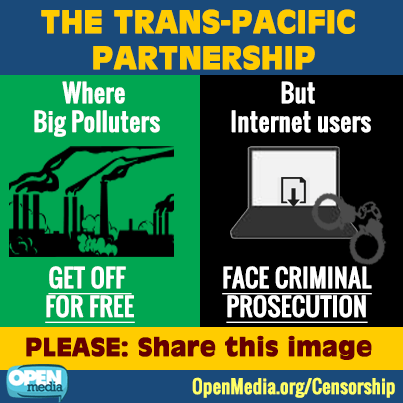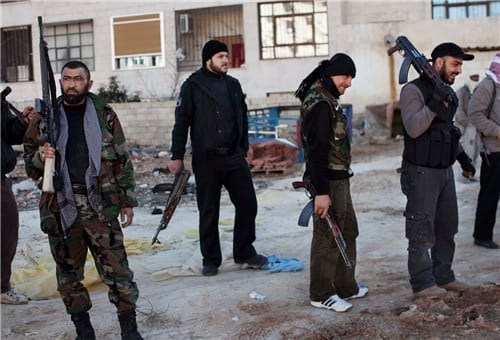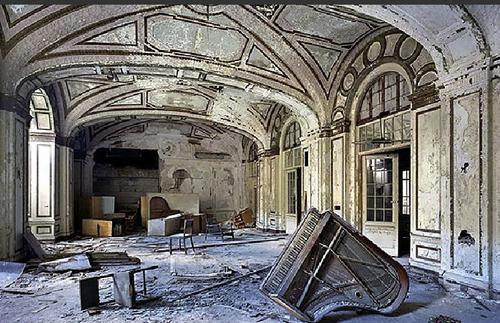Edward Martin and Mateo Pimentel } Simulpost with Axis of Logic

[dropcap]I[/dropcap]n part one of this series, we argued that anarchy is the solution to the problem of oligarchic control of democratic institutions. This holds true for economic institutions as well. And no better example can be provided than Obama’s sinister Trans-Pacific Partnership (TPP), which is designed in neoliberal fashion to financially reward the 1 percent on Wall Street and the 1 percent internationally, because it is all about the international elite, not just the average people in the United States who are expendable under the TPP arrangement. Obama knows this.
We argue that it is not just anarchism that will salvage democratic institutions, but also a Marxist economic vision that refuses to allow workers in the United States and international community to be exploited. Marx was correct when he argued that capitalism rests essentially on the exploitation of the working class. The problem remains one of conflict between labor and capital, which people like Paul Krugman the Keynesian and journalists like Chris Matthews the liberal refuse to acknowledge. The TPP is not some Greek tragedy where the actors are blind to their own demise; rather, they know completely what the outcomes are going to be for themselves at the expense others.
Read Development, Democracy and Welfare States: Latin America, East Asia, and Eastern Europe by Stephan Haggard and Robert R. Kaufman (2008)—they saw this coming. This is the motive for Occupy and why the oligarchy has got to go. What this form of globalization accomplishes is simply a reinforcement of neocolonialism and neoimperialism. In the third part of this series, we will pull apart the TPP, which is nothing more than NAFTA on meths. The following is our continuation of why oligarchies are perpetuated in democratic institutions.
Domination and Control of Institutions
Individuals who have ultimate authority in an organization are the ones who have the final decision-making power over the organization’s system of rewards or punishments, its budget and personnel, its policies and property. This means that enforceable authority has the power to exclude others from control over it. Organizational proprietors exercise “ultimate authority” and are invested, not solely by tradition or sentiment, but by state charter with the right to deal with the organization’s incorporated resources. Directors, trustees, and owners exercise power either by occupying the top positions in which ruling decisions are made or by hiring and firing those who do. William Domhoff asserts that:
“…control is in the hands of the board of directors, a group of men usually numbering between ten and twenty-five who meet once or twice a month to decide upon the major policies of the company. In addition … the board always includes at least the top two or three officers in charge of day-to-day operations … We consider the boards decisive because, despite the necessity of delegating minor decisions and technical research, they make major decisions, such as those of investment, and select the men who will carry out daily operations. In fact, their power to change management if the performance of the company does not satisfy them is what we … mean by control.”
Consequently, Michael Walzer observes that the directors of most organizations:
“…preside over what are essentially authoritarian regimes with no internal electoral system, no opposition parties, no free press or open communications network, no established judicial procedures, no channels for rank-and-file participation in decision making. When the state acts to protect their authority, it does so through the property system, that is, it recognizes the corporation as the private property of some determinate group of men and it protects their right to do, within legal limits, what they please with their property. When corporate officials defend themselves, they often involve functional arguments. They claim that the parts they play in society can only be played by such men as they, with their legally confirmed power, their control of resources, their freedom from internal challenge, and their ability to call on the police.”
The TPP is nothing more than NAFTA on meths.
The boards of directors of most business firms do not exercise a “collegial”power except in the formal, legal sense. In other terms, even among themselves directors seldom operate democratically since usually one or two of them enjoy a preponderant influence over the corporation. Bruce Berman notes that private power is exercised both “in the economy and society” through “organizations whose internal political processes are, with few exceptions, authoritarian, oligarchic and devoid of any democratic procedures or controls.” Where the board of directors consists of corporate employees dependent on the president for career advancement, the board simply reaffirms past decisions or presents modest but inconsequential changes. Top corporate managers, themselves board members and large stockholders, are the active power within a firm, selecting new members, exercising a daily influence over decisions, and enjoying a degree of independence. This same scenario can easily be translated into nonprofit institutions, education, churches, government, unions, administration and policy. Furthermore, the institutionally controlled roles are themselves so legitimized by practice and custom, that the coercive element of this oligarchic arrangement is in effect disguised.
 It appears evident, at least from what has been discussed, that authority is delegated downward within an organizational system and institutional structure and that it is extended, in anti-democratic fashion, in order to better serve those at elevated levels. Ralf Dahrendorf states, “For the bureaucrats the supreme social reality is their career that provides, at least in theory, a direct link between every one of them and the top positions which may be described as the ultimate seat of authority. It would be false to say that the bureaucrats are a ruling class, but in any case they are part of it, and one would therefore expect them to act accordingly in industrial, social and political conflicts.” Rousseau refers to people in this elite category as persons “hurried on by blind ambition, and, looking rather below than above them, come to love authority more than independence, and submit to slavery, that they may in turn enslave others.” Interestingly enough, Adam Smith also identifies this anti-egalitarian tendency when he states, “All inferior shepherds and herdsmen feel the security of their own herds and flocks depends upon the security of those of the great shepherd or herdsman; that the maintenance of their lesser authority depends upon that of his greater authority, and that upon their subordination to him depends his power of keeping their inferiors in subordination to them.”
It appears evident, at least from what has been discussed, that authority is delegated downward within an organizational system and institutional structure and that it is extended, in anti-democratic fashion, in order to better serve those at elevated levels. Ralf Dahrendorf states, “For the bureaucrats the supreme social reality is their career that provides, at least in theory, a direct link between every one of them and the top positions which may be described as the ultimate seat of authority. It would be false to say that the bureaucrats are a ruling class, but in any case they are part of it, and one would therefore expect them to act accordingly in industrial, social and political conflicts.” Rousseau refers to people in this elite category as persons “hurried on by blind ambition, and, looking rather below than above them, come to love authority more than independence, and submit to slavery, that they may in turn enslave others.” Interestingly enough, Adam Smith also identifies this anti-egalitarian tendency when he states, “All inferior shepherds and herdsmen feel the security of their own herds and flocks depends upon the security of those of the great shepherd or herdsman; that the maintenance of their lesser authority depends upon that of his greater authority, and that upon their subordination to him depends his power of keeping their inferiors in subordination to them.”
[dropcap]T[/dropcap]he monopolization of privileged positions and scarce resources by the hierarchical elite in an organization is justified by the claim that only experienced persons or trained experts have the expertise to participate in decision-making. However, Francis Rourke and Glen Brooks state the organizations and institutions are, “often forced to put on a dramatic show of scientific objectivity in its budgeting process in order to justify its requests for continued support, even though the dramatic props – elaborate formulas, statistical ratios, and so on – may have little to do with the way in which decisions are actively made within the … establishment.” Thus, modern hierarchical organization with its elaborate stratification of command and fragmentation of tasks may itself be less the outgrowth of technical necessity and more a means whereby the few control the many.
…
Consequently, Michels argues that the bureaucratic structure within organizations has two main functions: efficiency and class domination. The former is admitted, open and manifest; the later covert, unrecognized (by many) and unadmitted. In this sense, class conflict declines with the growth of bureaucracy, not because bureaucracy’s efficiency and productivity satisfies potential dissenters, but because the structural features of bureaucracy stifle the power resources of potential dissenters. It would therefore be correct to say that bureaucratization is another form of class conflict, a form in which one side wins and the other loses—and which might better be called class domination.
Organizations and Their Enlightened Self-Interest
Most organizations, arguably, are linked by a commonality of class interest. The common misunderstanding is to treat the diversity of organizations as a manifestation of the diffusion of power. Robert Lynd states that, “sheer multiplicity of organizations in society may not be assumed to indicate their discreteness and autonomy …” More often than not, the interaction of power between organizations and institutions is neither voluntary nor equal, since some institutions “occupy positions of established dependence upon other institutions.” This presupposes a distribution of power that some organizations possess more than others. Consequently, the resources of power are not randomly scattered among the population to be used in autonomous ways, but are distributed within a social system, and the way the system is organized has a decisive effect on what resources are available to whom. Any delineation of the resources of power would include property, wealth organization, social prestige, social legitimacy, number of adherents, various kinds of knowledge and leadership skills, access to technology, control of jobs, control of information, manipulation of symbolic expressions, and the ability to apply force and violence. Thus, if organizations and institutions have power as their major interest, and the maintenance of a class dominated society, then it can logically be concluded that there are elements in society that lack power. Lacking accessibility to power resources, certain classes of people will chronically gain a deficient share of necessities. These people, mostly children in the United States, do not participate as decision makers in most of the arrangements directly affecting their lives. They have no lobbies, no voice in the political system, no appeal from the vested interests of certain adults. The elderly, women, handicapped, and people of color, at least those in lower social classes, can be considered among the powerless in society as well.
[dropcap]E[/dropcap]very privileged class tends to propagate the notion that the existing social system constitutes the natural order of things. In this way, those elite members of organizations give legitimacy and permanence to their position. These elites, according to Weber, intend “to have their social and economic positions ‘legitimized.’ They wish to see their positions transformed from a purely factual power relation into a cosmos of acquired rights, and to know that they are thus sanctified.” The legitimating myths, or “status-legends” serve not only to bolster the self-esteem and soothe the conscience of the elite within organizations, but reinforce the important function of assigning an almost divine status to class dominance and the rule of elites within organizations. Rousseau captures this same idea when he states that “the strongest is never strong enough to be always master, unless he transforms his strength into right, and obedience into duty.” This can be seen in present day capitalist societies; profit and property are represented as serving not only the owning class but also all citizens. What corporations do for themselves is said to benefit the entire “Free World.” In the German Ideology Marx identified this tendency in which every group seeks to give “its ideas the form of universality and [attempts] to present them as the only rational and universally valid ones.” Both Marx and Engels held that throughout history, and in particular the historical development of capitalism, that government had been controlled by key capitalists and their allies, and thus the state in effect serves as the “executive committee” of the ruling and exploiting class.
In a society based on acquisition and competition, people acting in their self-interest do not readily sacrifice their own class advantages out of regard for the needs of others. Any notion of justice, based on utility maximizing, is not likely to compel “individual actors” to cast aside their own privatized pursuits. The history of class divided societies offers little hope to those who do not share in the relative access of resources in the midst of scarcity. In the absence of its natural defenders the interest of the excluded is always in danger of being overlooked according to both Mill and Marx. Theorists such as Lindblom and Woodhouse state that the common understanding is that, “the fundamentals of the existing system of wealth and privilege ought not be challenged.” Moreover, borrowing from Lenin’s critique of Western imperialism, Martin Luther King in the “Letter from Birmingham Jail,” concludes that “history is the long and tragic story of the fact that privileged groups seldom give up their privileges voluntarily.” And Obama has become a team player for the privileged elite because of the TPP treaty.
Thus, the threatened loss of power in organizations, and the tendency toward a more equal distribution of wealth and privilege, is seen not merely as a material loss, but as the cataclysmic undoing of all social order. Operating on the assumption that all distribution must be competitive rather than communal, the elite anticipate – correctly – that more material resources for the marginalized will only mean less for themselves, since a fundamental reordering of social priorities would entail a marked diminution of class privileges for the elite. Within this social and economic setting the reality of conflict is spawned and determined, according to Marx, precisely because “men make their own history; but they do not make it just as they please; they do not make it under circumstances chosen by themselves, but under circumstances directly encountered, given, and transmitted from the past.” Here Rousseau and Marx agree, arguing that the elite of any organization enjoy their status “only in so far as others are destitute of it. Because, without changing their condition, they would cease to be happy the moment the people ceased to be wretched.” Consequently, Rousseau argues that “we find our advantage in the misfortune of our fellow-creatures, and the loss of one man almost always constitutes the prosperity of another.” Noam Chomsky even goes so far as to state that organizations such as these are “designed to undermine democratic decision making and to safeguard the matters from market discipline. It is the poor and defenseless who are to be instructed in these stern doctrines.”
Oligarchy as the Iron Law
Weber examines the relationship between democracy and bureaucratic organizations and discovers a paradoxical relationship between the two institutions. Some legal requirements further democracy as well as bureaucracy, such as, the principle of “equal justice under the law.” This would also include technical and scientific knowledge rather than arbitrary decisions. Nevertheless, according to Weber, “‘democracy’ as such is opposed to the ‘rule’ of bureaucracy, in spite and perhaps because of its unavoidable yet unintended promotion of bureaucratization.” A major reason for this is that bureaucracy concentrates power in the hands of those in charge of the bureaucratic apparatus and thereby undermines democracy. Robert Michels, in Political Parties, also argues from another perspective, that a number of complex tendencies in organizations oppose the realization of democracy. He postulates that democracy leads to oligarchy and consequently the elite domination of policy outcomes. Michels goes on to state, “It follows that the explanation of the oligarchical phenomenon which thus results … from the consolidation of every disciplined political aggregate … reduced to its most concise expression, the fundamental sociological law of political parties (the term ‘political’ being here used in its most comprehensive significance) may be formulated in the following terms: ‘It is organization which gives birth to the dominion of the elected over the electors, of the manditaries over the mandators, of the delegates over the delegators. Who says organization says oligarchy.’”
…
Michels’ thesis in the “iron law of oligarchy,” challenges Rousseau’s concept of direct popular rule and both Madison and Jefferson’s representative form of democracy. The dysfunctional nature of existing democracy, for Michels, is not simply the result of social and economic underdevelopment and alienation, inadequate education, media control of propaganda advertisements, or the capitalist control of government organizations and institutions. Rather, the problem of democracy is rooted in its organic nature, and according to Michels’ logic, any organization must confront its tendency to be controlled at the top. He states, “The formation of oligarchies within the various forms of democracy is the outcome of organic necessity, and consequently affects every organization.” This phenomenon, for Michels, is an intrinsic dimension of bureaucracy and any large-scale organization or institution. As a result, “Every party organization represents an oligarchical power grounded upon a democratic basis. We find everywhere electors and elected. Also we find everywhere that the power of the elected leaders over the electing masses is almost unlimited. The oligarchical structure of the building suffocates the basic democratic principle.” Thus large-scale social organizations and democracy are incompatible, which is position similar to Lowi’s notion that elitist interest-group liberalism undermines democracy and Olson’s theory that large groups fail to identify and act on their self-interest, reinforce Michels’ position that the elite emerge from democratic dysfunction to dominate organizations. Michels found that even socialist organizations and trade unions that valued democracy could not pursue their goals, even with strong leadership. From this Michels proposed a general law that “the majority of human beings … are predestined by tragic necessity, to submit to the dominion of a small minority, and must be content to constitute the pedestal of an oligarchy.”
[dropcap]T[/dropcap]he underlying notion of a liberal democracy is that government organizations and institutions are to be administered in a democratic fashion by majority rule, respect for minority rights, freedom of speech and dissent, based on a constitutional framework. On the other hand, while democratic values and policies are to be implemented, the task must be implemented through the most efficient and effective administrative methods available. Therefore agencies, governed primarily by the principle of efficiency and effectiveness, tend to act in an autocratic fashion. Nevertheless, if Michels’ argument is a sound one, then the implications for government are startling: organizations and their subsequent policies are held captive by an elite clientele. The reality of an elite ruling government agencies, and for that matter, political parties, unions, religious organizations, etc., conveys the idea that popular rule is subverted. This leaves little doubt organizations and institutions by their very nature arepredisposed inherently to being co-opted by an elite faction. Thus organizations and institutions are designed to serve the interests of an elite cadre and not its rank and file members.
In summary, the “iron law of oligarchy,” with respect to democratic organizations and policy outcomes, functions in four different capacities. Organizations and policy outcomes: (1) mobilize the forces of indoctrination and formal socialization in the direction of established interests and dominant values; (2) control the means of rewards and punishments based on organizational structures and behavior; (3) preempt competing behavioral forms and thus structure the definition of “reality” to the advantage of the elite; and, (4) reinforce their own existence by preventing any question or ideological challenge to its purpose and mission. Thus Michels believed that any organization or political system, democratic or egalitarian, becomes oligarchic and therefore undemocratic.
[box] Edward Martin is Professor of Public Policy and Administration, Graduate Center for Public Policy and Administration at California State University, Long Beach, and co-author of Savage State: Welfare Capitalism and Inequality.
Mateo Pimentel is an Axis of Logic columnist, living on the US-Mexico border. Read the Biography and additional articles by Axis Columnist Mateo Pimentel. [/box]
© Copyright 2015 by AxisofLogic.com
This material is available for republication as long as reprints include verbatim copy of the article in its entirety, respecting its integrity. Reprints must cite the author and Axis of Logic as the original source including a “live link” to the article. Thank you!
[printfriendly]
Remember: All captions and pullquotes are furnished by the editors, NOT the author(s).
What is $5 a month to support one of the greatest publications on the Left?






